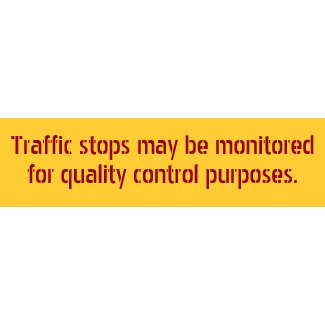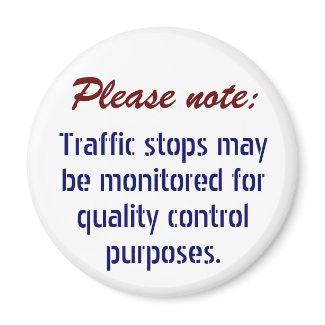While police and prosecutors have encouraged the growth of a surveillance state, they don't seem so enthusiastic about the growth of a surveillance citizenry. Maryland and other states have recently seen privacy laws invoked to squelch the unauthorized recording of public officers performing public duties in public areas. Until courts put an end to those bogus claims, we should make sure that police officers know that we may monitor traffic stops to protect our rights; I below offer a bumper sticker and magnetic door sign that ought to help on that front.
Radley Balko recently reported on the latest attempt to use privacy laws to punish citizens for recording police misconduct. In this case, Anthony Graber was arrested for posting on YouTube a video he'd captured on an un-uniformed Maryland state trooper, driving an unmarked car, pulling over and rushing at Graber with a drawn handgun. Soon after Graber posted the video, he was charged for violating the Maryland Wiretapping and Electronic Surveillance Act, Md. Code Ann., Cts. & Jud. Proc. § 10-401 et seq. (2010), which basically outlaws secretly recording a private conversation.
Maryland's police must be feeling a bit testy, these days, about getting recorded on-the-job by uppity citizens. Earlier this spring, an inconvenient video of the beating of Jack McKenna put the lie to the claims of Maryland police that McKenna had provoked the incident by attacking the officers and their horses. State and federal officials have since launched "excessive force" inquiries.
Did that video violate the privacy of the three officers, clad in riot gear and swinging batons, who surrounded and beat the unarmed McKenna? No. Neither did the video that Graber shot of the Maryland trooper strutting towards him with a drawn handgun. Courts have already explained that wrongs under the Maryland Wiretapping and Electronic Surveillance Act require a showing that someone's reasonable expectation of privacy has suffered violation (see Fearnow v. C & P Tel. Co., 104 Md. App. 1, 655 A.2d 1 (1995), rev'd on other grounds, 342 Md. 363, 676 A.2d 65 (1996)), and no officer can have a reasonable expectation of privacy while on a public street, performing public duties.
The Maryland ACLU has stepped forward to help defend Graber, and with any luck will soon educate local prosecutors about the proper scope of the Maryland Wiretapping and Electronic Surveillance Act. In the meantime, and in other jurisdictions where police threaten to deploy privacy laws against whistle-blowers, we citizens would do well to remind public servants that we can and will record their on-the-job performance. I've worked up a couple of notices to help.
This bumper sticker should help to put police on notice that you may record them during traffic stops, thus negating any claim to a reasonable expectation of privacy: Make sure that you place it where video taken from the officer's vehicle will record it! That proof might end up helping your case if, like Graber, you want to publicize police abuse.
To make doubly sure that you give adequate notice to an officer who subjects you to a traffic stop, you might also want to carry this handy magnetic sign:Once you have been pulled over, just roll down your window and slap the sign outside your door, where a police officer cannot fail to see it.
Click on either image to buy a copy for yourself or a friend. All proceeds will go to aid the defense of Anthony Graber. Perhaps his case would have turned out differently if he had had that bumper sticker on his helmet, or that magnetic sign on his gas tank. (I thank Prof. Orin Kerr for inspiring the wording of these notices, though he of course bears no blame for my legal hijinks.)
In the long run, as Prof. Glenn Reynolds has observed, we in the surveillance citizenry have an edge over those trying to create a surveillance state. We have more eyes, more cameras, and a more sympathetic message. There remain, however, several legal wrinkles to iron out before we can safely say we've turned the tables. I'll try to say more about those, and offer an all-purpose notice designed to cover a wide variety of citizen surveillance practices, in a subsequent post.
[Crossposted at Agoraphilia and The Technology Liberation Front.]
Sunday, May 30, 2010
Subscribe to:
Post Comments (Atom)


5 comments:
I think you may have overnegated when you said "a police officer cannot fail to miss it." Perhaps "cannot miss it," or "cannot fail to see it"?
Ah, right. Thanks.
great post, to me it makes reasonable sense that if you are in fact witnessing a police abuse then you have a right to record it so other people can be a witness.
Excellent post. As a photographer, I have gone beyond weary into outright fear in my confrontations with police. The misinformation within the ranks is becoming menacing. I have had on-duty officers tell me that I can not photograph buildings or people in public without their permission. I am standing on a sidewalk with my camera. I'm not causing a disturbance or blocking the path, and yet I have had officers go out of their way to inform me that I cannot photograph a building without permission from the owner. Since when did objects in public space have the expectation of privacy? Of course I always move on because rule #1 is never (EVER) argue with the police - they are always right, and even more vehemently when they are challenged.
This behavior by police -- reacting negatively and aggressively to being recorded on the job -- is perhaps understandable, but it's astoundingly unprofessional. If a policeman believes that his actions won't stand up to public scrutiny, then he has no business doing what he's doing.
I used to be a traffic cop, and while I doubt I would have welcomed being recorded, I believe I would have, at most, asked for a copy of the recording for my own purposes. (And I doubt I could have made even that stick.)
Bottom line: the police work for us, not the other way around. They are (and should be) subject to stricter rules and laws than we, not the other way around. As such, it makes absolutely no sense for a policeman to have legal protection that an ordinary citizen can't have.
The police have a difficult, dirty, unpleasant, and utterly necessary job to do, and we should all respect their willingness to do it. But they, in turn, should understand that they set an example for us, every time they put on the uniform -- and that they should behave better than we do, not worse.
The police know that, when they put on the uniform, they are On Duty in the eyes of the civilians around them. (Police take advantage of this fact all the time; that's what "showing the flag" is about.) The flip side is that they don't get to demand a right of privacy while wearing the uniform. They are responsible for their actions, first to their superiors, but ultimately to us.
"We the People". That's the way it works in America.
respectfully,
Daniel in Brookline
Post a Comment